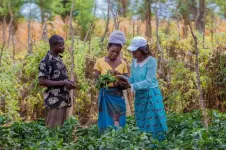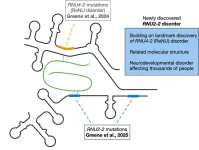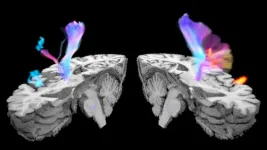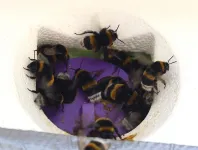(Press-News.org) Scientists writing a policy forum article in the CABI One Health journal say the “plant world” needs to come out and claim its place at the One Health table as part of a desire to break down barriers that currently limit true cross-domain integration.
The researchers say that while plant health is increasingly recognized as a vital part of One Health, it lacks recognition and – historically focussed on health service provision, zoonotic diseases and antimicrobial resistance – One Health overlooks plant health in strategic plans.
They add that cross-sectoral approaches, core to One Health, are already used in plant health fields like agroecology, sustainable food systems, and integrated landscape management – just not under the One Health banner.
Disconnect limits recognition of interconnected health challenges
The disconnect, they say, between the worlds of One Health and plant health limits recognition of interconnected health challenges, obscures critical knowledge gaps, and stifles opportunities for synergy.
Dr Solveig Danielsen, Senior Project Scientist One Health and Research at CABI, said, “By staying outside One Health’s framework, the ‘plant world’ misses the political and institutional clout of bodies like the Quadripartite and the One Health High-Level Expert Panel, essential for driving global support.
“The Food and Agriculture Organization of the United Nations, and other plant-focused stakeholders, could assert their role more clearly in tackling severe One Health issues like pesticide risks, mycotoxins, invasive species, and biodiversity loss.”
She added that barriers to change exist – including plant professionals often not associating their work with One Health and traditional One Health actors may fail to see the value of integrating plant health.
Dr Danielsen said, “Ideas and initiatives are surfacing, demonstrating different ways in which One Health approaches can be used in plant health, such as to ensure all aspects of a problem are considered in looking for plant health solutions, or to integrate plant health in a One Health biosecurity policy and regulatory framework.
“The planning of the next phase of the Quadripartite One Health Joint Plan of Action presents a timely opportunity to rethink strategies and break down barriers that currently limit true cross-domain integration.”
“Undeclared” One Health work
As part of the policy forum article, the scientists argue for the existence of “undeclared” One Health work and present six examples. One example is a meta-analysis by Mahon et al. (2024) which uncovered novel insights regarding global change drivers of infectious disease risks in humans, animals and plants.
They found that biodiversity loss, chemical pollution, climate change and introduced species are associated with increases in disease-related endpoints across human and non-human diseases, though context-specific effects are common.
Dr Urs Schaffner, Head Ecosystems Management at CABI and a co-author of the policy forum article, said the existence of “undeclared” One Health work is not a surprise.
He said, “Like One Health, the sciences of plant health, crop agriculture and ecosystems are defined by their own concepts, frameworks and integrative approaches, for example, agroecology, integrated crop management, sustainable food systems, sanitary and phytosanitary systems, social-ecological systems and integrated landscape management.
“Despite overlaps with One Health, the professional communities around One Health and plant health largely operate in separate worlds.”
Change is starting to happen
The scientists, however, say that change is starting to happen. They give the example of Hoffman et al. (2022) who propose applying a One Health perspective to address the trade-offs that lie at the interface of ensuring plant health for food security versus minimizing the risks of pesticides to people, animals and ecosystems.
Dr Jakob Zinsstag, co-author of the policy forum article and Editor-in-Chief of CABI One Health journal, said, “Reforming One Health is a collective responsibility. We must collaborate across disciplines – plant specialists, veterinarians, medical doctors, ecologists, anthropologists, sociologists, economists and experts from other relevant fields.
“By clearly demonstrating the added benefits of addressing human, animal, plant and ecosystem health in a holistic manner, we can firmly establish plant health as an integral part of the One Health framework.”
This policy forum article was supported by the One Health Hub, a programme managed by CABI and funded by UK International Development.
The One Health Hub is a learning and knowledge platform on One Health. It identifies knowledge gaps, analyses evidence, and works with the global one health community to shape policies for a more interconnected approach to health.
Additional information
Main image: A farmer checks the health of her crop in the Rufunsa District of Zambia (Credit: CABI).
Full paper reference
Danielsen, Solveig; Schaffner, Urs; Zinsstag, Jakob, ‘Worlds apart: Plant health and One Health and a path to convergence,’ CABI One Health, 10 April, DOI: 10.1079/cabionehealth.2025.0013
The paper can be read here from 12:00hrs UK time on 10 April 2025: https://www.cabidigitallibrary.org/doi/10.1079/cabionehealth.2025.0013
Media contact
For more information including an advance copy of the paper contact:
Dr Solveig Danielsen, Senior Project Scientist One Health and Research, CABI – email s.danielsen@cabi.org
Wayne Coles, Senior PR Manager, CABI – email w.coles@cabi.org
About CABI One Health
CABI One Health is an open access journal that seeks to optimize the health of humans, animals, plants, ecosystems, and their shared environment by focussing on their interconnections in a truly transdisciplinary way.
Find out more here.
END
Scientists say the “plant world” needs to come out and claim its place at the One Health table
Scientists writing a policy forum article in the CABI One Health journal say the “plant world” needs to come out and claim its place at the One Health table as part of a desire to break down barriers that currently limit true cross-domain integration
2025-04-10
ELSE PRESS RELEASES FROM THIS DATE:
A new tool to improve lives after brain injury is underway at The University of Texas at San Antonio
2025-04-10
Traumatic brain injury (TBI) is a serious issue affecting thousands of people in the U.S. every year. For military service members, the impact is even more profound. Since 2000, over 492,000 cases of TBI have been reported, making it one of the defining injuries of modern warfare, according to the U.S. Department of Defense. Many veterans have experienced multiple TBIs, raising concerns about long-term effects on brain health. Given the subjective and nonspecific nature of symptom presentation, treatment and prognosis can be difficult.
Researchers ...
Guinea pigs: A promising animal model to study the human embryo
2025-04-10
The first few days of a human embryo’s development, known as pre-implantation, are important. It’s when the first cells are formed, and these decide if the embryo can survive, how it will implant in the womb and how the tissues of the fetus will develop.
Today there are still logistical, ethical and legal limitations to using human embryos for research purposes, so scientists use alternative models including stem cell-based and animal models.
In a new study published in Nature Cell Biology, Sophie Petropoulos, a researcher ...
The rise of "gut feelings" in US political rhetoric
2025-04-10
Discussion of "alternative facts" has gained sad notoriety in US politics. Yet the question has been around much longer: How do people conduct political debates – is the focus more on facts or personal opinions? A team of international researchers led by the Cluster of Excellence "The Politics of Inequality" looked into the matter. The researchers examined political rhetoric in eight million speeches by members of the US Congress between 1879 and 2022 to see if the focus of their language was more on data and facts or personal convictions and subjective interpretations.
The team noticed a significant decline in the use of evidence-based political ...
How mothers adapt to the metabolic demands of nursing
2025-04-10
Nursing poses major metabolic demands on mothers, to which they respond by eating more and saving energy to sustain milk production. There are significant hormonal changes during lactation, but how they lead to metabolic adaptations in nursing mothers remained unclear. In this study, which appeared in Nature Metabolism, leading researchers at Baylor College of Medicine and Pennington Biomedical Research Center uncovered a mechanism that connects prolactin, estrogen, the brain and metabolic adaptations during lactation.
“We worked with animal models to investigate ...
Caspian Sea decline threatens endangered seals, coastal communities and industry
2025-04-10
UNDER EMBARGO UNTIL THURSDAY 10 APRIL, 10AM LONDON TIME, 5AM EASTERN TIME.
Urgent action is needed to protect endangered species, human health and industry from the impacts of the Caspian Sea shrinking, research led by the University of Leeds has found.
Water levels in the Caspian Sea – the world’s largest landlocked water body – are getting lower, as hotter temperatures cause more water to evaporate than is flowing in. Even if global warming is limited to below 2°C, ...
Landmark study identifies new genetic cause of neurodevelopmental disorders, bringing long-awaited answers to families
2025-04-10
New York, NY [April 10, 2025]—A seminal study from researchers at the Icahn School of Medicine at Mount Sinai and their collaborators in the United Kingdom, Belgium, Spain, the Netherlands, and Iceland has uncovered a new genetic cause of neurodevelopmental disorders (NDDs). The discovery offers both closure and hope to potentially thousands of families worldwide who have long been searching for answers.
The study, published in the April 10 online issue of Nature Genetics [DOI: 10.1038/s41588-025-02159-5], reveals that mutations in a small, previously overlooked non-coding gene called RNU2-2 are responsible for relatively common NDD. Non-coding genes ...
Scientists create “metal detector” to hunt down tumors
2025-04-10
Researchers have created a “metal detector” algorithm called PRRDetect to hunt down vulnerable tumours, in a development that could one day revolutionise the treatment of cancer.
In a paper published today (Thursday 10th April) in Nature Genetics, scientists funded by Cancer Research UK and the National Institute for Health and Care Research (NIHR) analysed the full DNA sequence of 4,775 tumours from seven types of cancer. Based at the University of Cambridge and NIHR Cambridge Biomedical Research Centre, they used that data from Genomics England’s 100,000 Genomes ...
New USC study identifies key brain networks behind post-stroke urinary incontinence
2025-04-10
A new USC-led study using functional magnetic resonance imaging (fMRI) reveals the neural mechanisms that contribute to urinary incontinence, a common condition affecting stroke survivors that has a significant impact on their quality of life.
The research, just published in Stroke, was conducted by a multidisciplinary team of urologists, neurosurgeons, and imaging experts from the Keck School of Medicine of USC, Keck Medicine of USC, the Rancho Los Amigos National Rehabilitation Center, and the Shirley Ryan Ability Lab. The team discovered significant differences in brain activity during voluntary versus involuntary bladder contractions, presenting potential pathways for targeted therapies.
Urinary ...
Hidden potential in multiple disabilities
2025-04-10
Using eye-tracking — a technique for recording and analysing eye movements — a team from the University of Geneva (UNIGE) has shown that individuals with multiple disabilities can improve their social and emotional skills. Although these patients are often considered ‘‘untestable’’, nine young people have undergone personalised training over a period of one year, with promising results in terms of their ability to socialise. This work opens the way to new methods of assessment and support. It is published in Acta Psychologica.
Multiple disabilities involve a combination of severe intellectual and motor impairments, resulting in profound dependence. ...
How to protect bumblebee colonies safe from killer moths? Keep honeybee hives away from them
2025-04-10
Since the pandemic, we are very aware of the power of social distancing to protect against infectious disease. But can social distancing be effective if the infectious agent isn’t a virus or bacterium, but an insect powered by a brain and wings, and with the instinct to seek out new hosts?
Now, a study published to Frontiers in Bee Science has shown that physical distance does play a leading role in protecting bumblebees against a flying insect parasite, the bumblebee wax moth Aphomia sociella. The source of the potentially lethal infection was another species, namely nearby hives of domestic honeybees.
“Here we show that infestation with bumblebee wax moths is much greater ...
LAST 30 PRESS RELEASES:
New strategies boost effectiveness of CAR-NK therapy against cancer
Study: Adolescent cannabis use linked to doubling risk of psychotic and bipolar disorders
Invisible harms: drug-related deaths spike after hurricanes and tropical storms
Adolescent cannabis use and risk of psychotic, bipolar, depressive, and anxiety disorders
Anxiety, depression, and care barriers in adults with intellectual and developmental disabilities
Study: Anxiety, gloom often accompany intellectual deficits
Massage Therapy Foundation awards $300,000 research grant to the University of Denver
Gastrointestinal toxicity linked to targeted cancer therapies in the United States
Countdown to the Bial Award in Biomedicine 2025
Blood marker from dementia research could help track aging across the animal world
Birds change altitude to survive epic journeys across deserts and seas
Here's why you need a backup for the map on your phone
ACS Central Science | Researchers from Insilico Medicine and Lilly publish foundational vision for fully autonomous “Prompt-to-Drug” pharmaceutical R&D
Increasing the number of coronary interventions in patients with acute myocardial infarction does not appear to reduce death rates
Tackling uplift resistance in tall infrastructures sustainably
Novel wireless origami-inspired smart cushioning device for safer logistics
Hidden genetic mismatch, which triples the risk of a life-threatening immune attack after cord blood transplantation
Physical function is a crucial predictor of survival after heart failure
Striking genomic architecture discovered in embryonic reproductive cells before they start developing into sperm and eggs
Screening improves early detection of colorectal cancer
New data on spontaneous coronary artery dissection (SCAD) – a common cause of heart attacks in younger women
How root growth is stimulated by nitrate: Researchers decipher signalling chain
Scientists reveal our best- and worst-case scenarios for a warming Antarctica
Cleaner fish show intelligence typical of mammals
AABNet and partners launch landmark guide on the conservation of African livestock genetic resources and sustainable breeding strategies
Produce hydrogen and oxygen simultaneously from a single atom! Achieve carbon neutrality with an 'All-in-one' single-atom water electrolysis catalyst
Sleep loss linked to higher atrial fibrillation risk in working-age adults
Visible light-driven deracemization of α-aryl ketones synergistically catalyzed by thiophenols and chiral phosphoric acid
Most AI bots lack basic safety disclosures, study finds
How competitive gaming on discord fosters social connections
[Press-News.org] Scientists say the “plant world” needs to come out and claim its place at the One Health tableScientists writing a policy forum article in the CABI One Health journal say the “plant world” needs to come out and claim its place at the One Health table as part of a desire to break down barriers that currently limit true cross-domain integration





